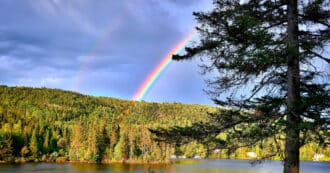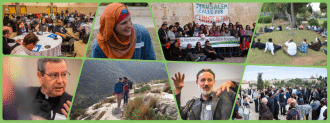By Quinn McVeigh
Environmental racism is a key focus of the environmental justice movement. It refers to not only a disproportionate access to environmental benefits such as clean air and local parks, but also to disproportionate exposure to hazards such as toxic waste and contaminated water supply 1. It is not caused by anything relating to the essence of the environment itself, but instead by race relations, governance, systemic racism, resource dynamics, and institutional failures. For example, many suggest that environmental racism is rooted in corporations targeting communities of color for potentially hazardous projects, because the communities may not have the political and economic resources to combat them.2 Some others believe that environmental racism can be partly attributed to Western environmentalism’s lackluster efforts to help mobilize people of color, and even having a relatively racist past in itself.3
Regardless of what the cause of environmental racism is, one thing we do know for sure is that it exists. A variety of studies have concluded that people of color are more exposed to particulate matter, volatile organic compounds like benzene, and greater levels of overall pollution.4 Data has shown that race is one of the major determinants of accessibility to water supplies and sanitation.5 We have seen all over the world that people of color are more burdened with environmental injustices than others.
In the United States, there is a stretch of land in Louisiana nicknamed, “Cancer Alley,” where residential areas are excessively exposed to pollution from petrochemical facilities putting their health disproportionately at risk. Within this stretch of land is a community called Reserve, in which the residents are 50 times more likely to get cancer than other Americans.6 The majority of residents in Reserve are black or African American. In Nigeria, there is a long past of unregulated drilling by oil companies like Shell. This has exposed many people of color to environmental hazards and depletion of land needed for livelihoods. Additionally, it has even resulted in deaths of environmental activists including Ken-Saro Wiwa and eight others killed by government officials.7 Environmental racism exists, and many do not have the political and economic capacity to fight it.
The United Church of Christ (UCC), a prominent faith-based organization involved in a plethora of social justice initiatives, was one of the major players in the birth of Western environmental justice. Soon after protests in Warren County, Ohio over the placement of a landfill for toxic chemicals such as Polychlorinated biphenyl (PCBs) in a mostly black community, the organization published a report analyzing race and toxic waste facilities in the U.S. The Report, “Toxic Race and Race” found that toxic waste facilities were disproportionately distributed throughout black communities and that race is one of the “top among variables associated with the location of a toxic waste facility.”8 The UCC brought attention to environmental racism in the Western world. In fact, Benjamin Chavis, an integral figure in Warren County and UCC efforts and the Southern regional program director of the UCC Commission for Racial Justice at the time, coined the term “environmental racism.”9
As demonstrated by the UCC’s influential history in the environmental justice movement, faith organizations can play a key role in promoting the elimination of environmental racism. With recent events surrounding the killings of Breonna Taylor, George Floyd, Amhaud Arbery, and more, the world has seen inspiring activism around condemning racism and pushing it out of systemic society. In this time, faith organizations have been stepping up to bring awareness to the violence and injustice inflicted upon black people and communities. For example, Buddhist centers like the Brooklyn Zen Center and the Soto Zen Buddhist Organization have released a series of statements to bring awareness to police brutality.10 A group of 130 Jewish organizations have collaborated to release a statement pledging to combat systemic racism.11 Behind the leadership of Imam Jihad Saafir, The Muslim Anti-Racism Collaborative has created a set of “solidarity actions” to highlight actions for non-Black Muslims should take to show support.12
We must acknowledge that all of this is not enough though, and that it certainly cannot only be during times of great civil unrest and international coverage that faith organizations pledge to spread awareness.
Systemic oppression of marginalized races and ethnicities, including through environmental racism, is an issue that is dynamic and perpetual.
Thus, faith organizations must be in dynamic and perpetual motion, empowering communities to fight and spread awareness as far as their reach can go.
- “Environmental Justice & Environmental Racism.” Greenaction for Health and Environmental Justice. http://greenaction.org/what-is-environmental-justice/.
- “Getting to the Root of Environmental Injustice.” Vermont Journal of Environmental Law. http://vjel.vermontlaw.edu/getting-to-the-root-of-environmental-injustice/.
- Purdy, Jedediah, Elizabeth Kolbert, and Naomi Klein. “Environmentalism’s Racist History.” The New Yorker. https://www.newyorker.com/news/news-desk/environmentalisms-racist-history.
- II, Vann R. Newkirk. “Environmental Racism Is Real, According to Trump’s EPA.” The Atlantic. Atlantic Media Company, February 28, 2018. https://www.theatlantic.com/politics/archive/2018/02/the-trump-administration-finds-that-environmental-racism-is-real/554315/.
- “Uswateralliance.org.” Uswateralliance.org, n.d. http://uswateralliance.org/sites/uswateralliance.org/files/Closing the Water Access Gap in the United States_DIGITAL.pdf.
- Lartey, Jamiles, Oliver Laughland, and Sam Morris. “’Almost Every Household Has Someone That Has Died from Cancer’.” The Guardian. Guardian News and Media. https://www.theguardian.com/us-news/ng-interactive/2019/may/06/cancertown-louisana-reserve-special-report.
- “Ken Saro-Wiwa.” Goldman Environmental Foundation. https://www.goldmanprize.org/recipient/ken-saro-wiwa/.
- “A Movement Is Born: Environmental Justice and the UCC.” United Church of Christ. Accessed June 15, 2020. https://www.ucc.org/a_movement_is_born_environmental_justice_and_the_ucc.
- “Benjamin F. Chavis, Jr.’s Biography.” The HistoryMakers. https://www.thehistorymakers.org/biography/benjamin-f-chavis-jr.
- Buddhadharma, Roar Staff, Lion’s Roar, and Lion’s Roar. “Buddhist Organizations and Teachers Respond to George Floyd Killing, Protests.” https://www.lionsroar.com/buddhist-organizations-and-teachers-respond-to-george-floyd-killing-protests/.
- Dolsten, Joseph. “130 US Jewish Groups, Outraged by Floyd Killing, Pledge to Fight Systemic Racism.” The Times of Israel, June 3, 2020. https://www.timesofisrael.com/130-jewish-groups-outraged-by-floyd-killing-pledge-to-fight-systemic-racism/.
- “Action Items for Solidarity Against the Murder of Black Men and Women.” Muslim Anti-Racism Collaborative, May 31, 2020. http://www.muslimarc.org/action_items_for_solidarity.
Quinn McVeigh is an intern at The Interfaith Center for Sustainable Development.
*Featured image source









